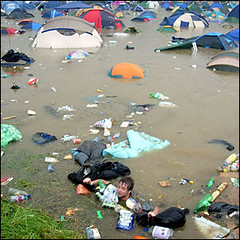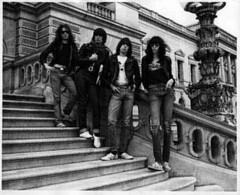Man Overboard
A concentration on books, movies, music.
Wednesday, June 29, 2005
Monday, June 27, 2005
Off The Rails (II)
I kind of jumped the gun, a few weeks back, when it seemed to me that Marcus had finished his trip. You know how he can mutter - in fact I think his winding up muttering has been the best part of the show. I loved the night when he wandered off, saying that he'd been to a party, where he got talking to some people about trains, trains, trains, bluff, trains, trains, bluff ... It finally dawned on him that he was in a marquee talking to himself!
Wonder why. He must have been in his element shooting last night's show - those two completely obsessive train fellows put him to shame.
So, anyway, this is a second round of thanks for the show, its been great. Nice to see my friend Jordan on the tele and all, even if it was a little hard to grasp what she was saying - something metaphysical about trains, their symbolism and their reality.
Nice too to see my old stamping ground, Northland.
One thing this show has confirmed for me is that I have to make a train trip, and soon, or next thing you know I'll be clicking on that little box on the Toll website to apply for a job as a train driver. Only takes six months of NZQA papers, should be a doddle. But the last time I was on a train was the Prospector, going from Kalgoorlie to Perth last summer.
Apparently there are no trains on Rarotonga. That's a surprise. I'll have to sort something out when I get back, but doubt that I can afford the newly announced Great New Zealand Steam Journeys - they want $5000!
Big Day Out Was Never Like This!
I went to Glastonbury, once. It scares me that I have no recollection of any of the bands playing. My three memories are of the bus trip from Victoria Station there and back, hanging around the little town in the meantime and the rain. Oh, the rain. Oh well, it could have been worse - the fellow in this pic is feeling a mite chilly and up to his neck!
Friday, June 24, 2005
End of the Century: The Story of the Ramones
(Dir Michael Gramaglia and Jim Fields)
I'm a little confused. When I saw 24 Hour Party People, the claim was made that it was going to a Joy Division gig that created the inspiration to form the Sex Pistols. Now, exactly the same claim is made for a Ramones gig, when the Ramones grew tired of the miserable attendances at their US gigs and went for the sold out shows that the UK (and Brazil (!)) delivered. According to the movie, they never really hit the big time in the States, although there was much mention of the huge impact they had on bands which did make it big. Lack of popular appeal was attributed to being the precursor of a big movement; the pioneers always pave the way but don't get the gold
Anyway, this was a surprisingly funny and tender movie, tracing the life and demise of one of the world's greatest punk bands. Apparently, the Ramones started simply as a result of Johnny, Joey and DeeDee being the only three people in their area who liked the Stooges (or maybe it was MC5?); that was enough to make them gravitate towards each other and get something going.
Of course, there were the obligatory accounts of intra-band tensions - Johnny stole Joey's girlfriend (and married her - this led to a 17 year spat between them and the song The KKK took my Baby Away); Johnny was right wing, Joey was left wing; Johnny was a control freak, DeeDee and Tony needed their space; DeeDee wanted to be in a band where everyone got wasted on drugs, no-one else did.
This last one surprised me - that the Ramones were on the whole clean living; their commitment to getting the Ramones right meant that they couldn't fuck around with drugs and alcohol. Not much, anyway. Another suprise was seeing Johnny bless President Bush (genuinely) as he collected the musical Hall of Fame tribute. DeeDee, of course, simply thanked himself for being great!
The more I heard about the differences between the band members, the more impressed I became that the Ramones stuck together for such a long time, mainly as the result of a sense of professionalism. I mean - imagine being the leader, in effect, and a guitar player of a band where you have to play
The KKK took my Baby Away, knowing that your lead singer is accusing you of being the KKK!
I wasn't really keeping tabs on the funny comments being made, but I think the funniest thing of the whole movie was seeing shots of DeeDee as a rapper: he later confessed that he was never any good at it, didn't have the moves or the voice; although for a while, he did have the bling. I did like the roadie's comment: that he knew the band had made it big when not just the band but its roadies and management had groupies lined up as well. And I guess there was an element of black humour in hearing about Phil Spector holding the Ramones hostage, at gun point no less, so that they would stay while he made them play a single note 70 times, meanwhile pacing around the room for 12 hours!
Of course, being the Ramones, there had to be lots of music and footage of their shows although, as one camera person said, once thy started doing big shows, it became hard to film. You can understand why really: poor technology meaning the camera had to be up close, where you have hundreds of fans going mental! Even some of the film they did show had degraded so badly that there were just a few blurry images.
Apart from the music, there were quite a few short extracts of interviews with various band members that brought them alive: Johnny seemed to be persistently sour (he saw it as a sign of internal "weakness" that he felt sorry when Joey died), DeeDee was pretty easy going and funny, in a fucked up sort of way - someone descibed him as an eternal hyperactive six year old. All dead now, sadly. Joey being the first to go meant we didn't see all that much of him, but the film did give a pretty good account of his original shyness (the lead singer of the Ramones was shy!! Who'd have thought it.) and growing confidence as the band started to work.
I think the one thing I would have liked was for the music to have been louder - either the cinema needed to turn the wick up a bit or the movie should have been produced with a really in your face sound. Apart from that, it was a great opportunity to see a band which has been a part of my life for so long. I wonder if they will ever do the same for Patti Smith.
Thursday, June 16, 2005
Never Let Me Go
(by Kazuo Ishiguro, 2005)
It is very difficult to talk about this book in any meaningful way without getting into its substance. I read it without having any idea of where it was going, and found it profoundly moving. Others have told me that they did know what was going to happen, and still found it moving, so maybe there isn't a problem.
Kathy is 31: she is reflecting on her days as a school girl, in particular on her relations with her closest friend Ruth and a boy called Tommy, who went off with Ruth. It turns out that Ruth was the kind of friend that is the stuff of a Margaret Atwood novel: mean-spirited to the point that although she fully knew that Tommy and Kathy should have been together, she made sure they didn't.
So, on the surface, there is a fairly pedestrian telling of that story, with a narration that continuously pauses to go back for more details. So, we have things like "I want to talk about the Norfolk trip .. but I'll first have to go back a bit, to give you the background and explain why it was we went". Quite who the "you being addressed is is never explained.
But there is much more going on in this novel, and that is only gradually revealed. First we learn that all of the children at this very special school are clones, probably of prostitutes, drugs, and other people of no account in society. Then we learn of their very special purpose: after a period of being "carers", they will become "donors" until they, inevitably, are "completed".
What is being donated are their organs - lungs are mentioned, but no doubt the donation process goes on until something vital for life is taken. Donors give between two and four times before they are "completed" - dead. The carers are those who provide companionship to donors - because there is a sharp line drawn between the clones and those for whom they make donations. So, when, about half way through, I learnt that all carers became donors, it gave an extra significance to the opening statement in the book - that Kathy is about to stop being a carer, because eleven years "sounds enough". Most do it for two or three years.
Being clones, one major concern is whether they have "souls" - there are committees of non-clones set up to try and determine that, with the clones all being asked to produce art to be assessed for that purpose. Of course, while they were young, none of the kids had any idea of who or why they were, but did notice the strange behaviour of some of the adults, who'd not go anywhere near them. Another big dilemma for the adults was the extent to which, and how quickly, the clones should have their fate revealed to them: it was interesting how Kathy and Tommy get the sense that there are things going on around them that are being deliberately with-held.
In terms of how they get on with each other, go after each other, fight and have their problems, all of the clones seem as human and real as any other character in a book. So - that leads to an immense sadness in the adults who are looking after them.
There is one scene in which Kathy is dreamily singing along to her favourite tape, a song with the line "Baby. baby, never let me go" while holding a pillow and imagining it is her baby (not knowing that that can never happen but imagining it is a miracle baby born to someone who can't have babies). She is seen by "Madame" but notices that Madame was crying.
Years later, Ruth Tommy and Kath go and visit "Madame" who finally explains why she was crying:
When I watched you dancing that day, I saw something else. I saw a new world coming rapidly. More scientific, efficient, yes. More cures for the old sicknesses. Very good. But a harsh, cruel world. And I saw a little girl, her eyes tightly closed, holding to her breast the old kind world, one that she knew in her heart could not remain, and she was holding it and pleading, never to let her go.And there you have it. The novel is a cautionary tale, warning of the price of progress and a lament for that which is lost in its name.
Monday, June 13, 2005
So incredibly COOL!
"Queenslanders will have the chance to celebrate the history and future of QR when a relic of a bygone era steams up the coast as part of QR's 140th anniversary celebrations.
On 10 July, an historic steam locomotive will leave Brisbane for a 15-day journey up and down the Queensland coastline.
The BB18 1/4 steam locomotive, the last to be built for a Government railway in Australia, will pull six vintage carriages with the capacity to carry 200 passengers."
Stupid need to work. Sucks!
Sunday, June 12, 2005
Taliband, Debonaires, Accelerants
(Arc Cafe, Saturday 11 June)
I damn near didn't go. The very name Taliband struck me as too naff to be taken seriously and I'd never heard of the Debonaires, so it was down to how much I wanted to see the Accelerants. Luckily, I did a bit of googling and found an inspiring review of them on the Critic website.
I really had no idea what the Taliband did. It turns out they produce a pleasing mix of reggae influenced rock and, more particularly, ska and a touch of old skool (i.e. fast) Northern Soul. Luckily they came with their own entourage, otherwise they would have been playing to a depressingly empty dance floor. I didn't actually join them, because I spotted one of my students dancing where I would normally be, and felt quite self-conscious, but will definitely be checking them out again and, no doubt, dancing.
If I was to say that the Debonaires did a note for note copy of Twist and Shout, that would give a fair account of where they fit in the musical spectrum. They did a total of six songs, as they knew no more, including two oroginals and T-Rex's "I Love to Boogie". I'd say that bands like the Checks have given these guys the idea to do what they're doing, but while I found them to be very good showmen, particularly the frontman and bass player, they were not that involving. I had to laugh at the wee guitar player: he came down off the stage and was trying to eyeball the audience but wasn't quite able to pull it off, just looked harmless.
Now the Accelerants - these guys were great, although I really wish they were able to play without re-tuning etc between each song, as it slowed down the momentum. By the third song, I'd forgotten my qualms about looking foolish and was getting my groove on. When they finally hit their last song, Motorcade, I was pretty much unconscious of my surroundings altogether - it was interesting watching myself re-acquaint myself with my surroundings as the song came to an end. I don't think I've ever heard any of their music before, but scored a second hand copy off RG today, so will be able to get more familiar.
Ibid: A Life (A Novel in Footnotes, by Mark Dunn)
This book has two gimmicks, which might be enough to suggest that it will be crap. Surprisingly, it isn't: it manages to be a tender and revealing account of a fellow's life.
The first gimmick is that the central character, Jonathan Blashette, has three legs:

This physical feature is played down - there is a bit of trouble getting him shoes:
Jonathan Blashette writes in his Early Memories of an argument between his mother and a local cobbler over the cost of making three shoes, Emmaline contending that she should only have to pay half again more than what she would have paid for a pair. The cobbler, however, deemed the request a "special order" and tacked on a surcharge. Jonathan continues:The one major thing that happened to him thanks to his third leg is that in September 1900, he caught the eye of Thaddeus Grund, proprietor of a Travelling Circus and Wild West Show and joined up. Not for long, however: by October 1900, he had tried to escape and after a legal fight to get him out of his contract, he was home again by the end of the year. Thereafter, he led a fairly normal life to the point that he was called up for service in World War One. This gave him the inspiration for what to do with his life:
Mother threatened to take her business elsewhere, only to discover that all the cobblers in town were related by blood and had something of a rudimentary price-setting system in place; one which put her at a decided negotiatory disdvantage. In the end, Mother and the shoemaker reached a compromise. She bought me a pair of handsome boy's lace shoes and the cobbler threw in, at only a nominal additional charge, an orphaned remnant from the previous year's Thanksgiving pageant - a shiny black-buckled Pilgrim's shoe which didn't match the others by any stretch of the imagination but nonetheless had a certain historically evocative charm about it.
I want to come back from this war. And all in one piece if that isn't asking for too much. (Unlike these other fellows, I could lose a leg and not be put out too much.) See, I want to start a business. You will laugh. This is the rankest-smelling place on the face of the earth. The stench of death gags you. The waft of mustard gas ... makes you want to wretch. Unwashed humanity. B.O. with a capital B. The ladies have their perfumes and their rose water and their Mum-cream. I'm going to make something for the fellows. A deodorizer for the male underarm. That would be a good start, right?And so he does. The other gimmick about this book is that the publisher has ostensibly destroyed the only copy of the manuscript (by allowing his three year old son to push it into a bath full of water). All that remains are the footnotes to the biography - it is through these that Jonathan's story is told. It works, perhaps even better than a traditional narrative might have, where the author is coralled into telling a story through connected sequences. By just having footnotes, the author can shine lights into the important element of a fellow's life. Luckily, Jonanthan Blanchette was enough of a public figure and had sufficient other public figures around him that there were plenty of accounts of the key areas of his life. Plus, he kept up a journal.
Thanks to these sources, we gain a pretty good picture of who Jonathan was as well as how he perceived himself and his relations with the world. The one minor criticism is that, as the footnotes are supposedly derived from a number of sources, we might have expected more variation in the voice. Throughout, the same sort of wryly comical tone is maintained; thankfully, it was an enjoyable voice.
Sunday, June 05, 2005
Enduring Love
(Dir Roger Michell, with Daniel Craig (Joe), Rhys Ifans (Jed), Samantha Morton (Claire), Bill Nighy (Robin) & [the woman in the wheelchair in Notting Hill] as Robin's wife.)
I really should have paid a bit more attention before going to this movie - I went along because I'd read the book and saw that the movie was about to close. As a result, it was something of a shock to see one of my favourite acresses - Samantha Morton - and then another to see one of my favourite actors - Bill Nighy - turn up on screen. Not that Nighy had a major part: he was the mate who offered a place of refuge and the occasional voice of sanity to Joe.
I was convinced that somewhere along the line I'd said something about Ian McEwan's novel, Enduring Love, but it appears not. As a book, it was quite hard going, and I can't really work out what people who have not read the book will get from the movie (not that the movie closely follows the book; towards the end there are substantial changes). Sure, they'll be on the edge of their seats in the opening scenes, when Joe sees a hot air balloon with a young boy in it starting to get out of control. He, and a number of others in the locale, rush to his aid, all clinging desperately to the ropes. Eventually, the height gets too much for all of them, and they pretty much drop simultaneously - except for one, who finally lets go when it is far too late.
One of Joe's pre-occupations throughout is whether he was first to let go, and thus made it harder for everyone else and, in a way, causes the death of the last man hanging. In the book, there is the suggestion made, one which is finally answered in the negative, that maybe this tragedy has led to Joe becoming unbalanced and thus imagines all that comes afterwards. The film doesn't really make that suggestion at all: we see Jed fairly early on, see him inviting Joe to join him in prayer, see him get more and more obsessed with Joe, to the point that he becomes convinced that when Joe is innocuously opening and closing the curtains on his flat, he is really signalling to Jed. People have complained the film is slow, and it is I guess, I even managed to go to sleep at one point, but it has a point - the development of Jed's obsession and the way it wreaks havoc on Joe's life, particularly in his relationship with Claire.
Of course, the title is of significance: one of the major enquiries is as to the endurance of love (or whether we can endure its onslaught). Despite there being lots of proof around that people are falling and staying in love, Joe's philosophical stance is that love is just biology, that it doesn't endure, doesn't even really exist. He even gets to teach that in his job as uni professor, of philosophy I think. So, it is a nice reversal to have Jed stalking him out of love, not just human love but as an expression of the love of Jesus. But there's a huge change in the movie from the way that this caused Joe and Claire's relationship to just sort of stutter to a close in the book. The movie is much more decisive and close-textured, there is a more definite re-affirmation which kind of takes the edge off much of what Joe had been saying. I think McEwan had a much darker and more cynical attitude in the book, but I suppose its hardly surprising to find a movie softening the hard edges provided by a book.
I'm left not really knowing what to make of this movie myself: sure it was beautifully made, Isphan made for a wonderfully obsessed stalker but it didn't call for all that much from the other actors, particularly my favourites. Most of what Samantha Morton had to do could have been done by pretty much anyone.







